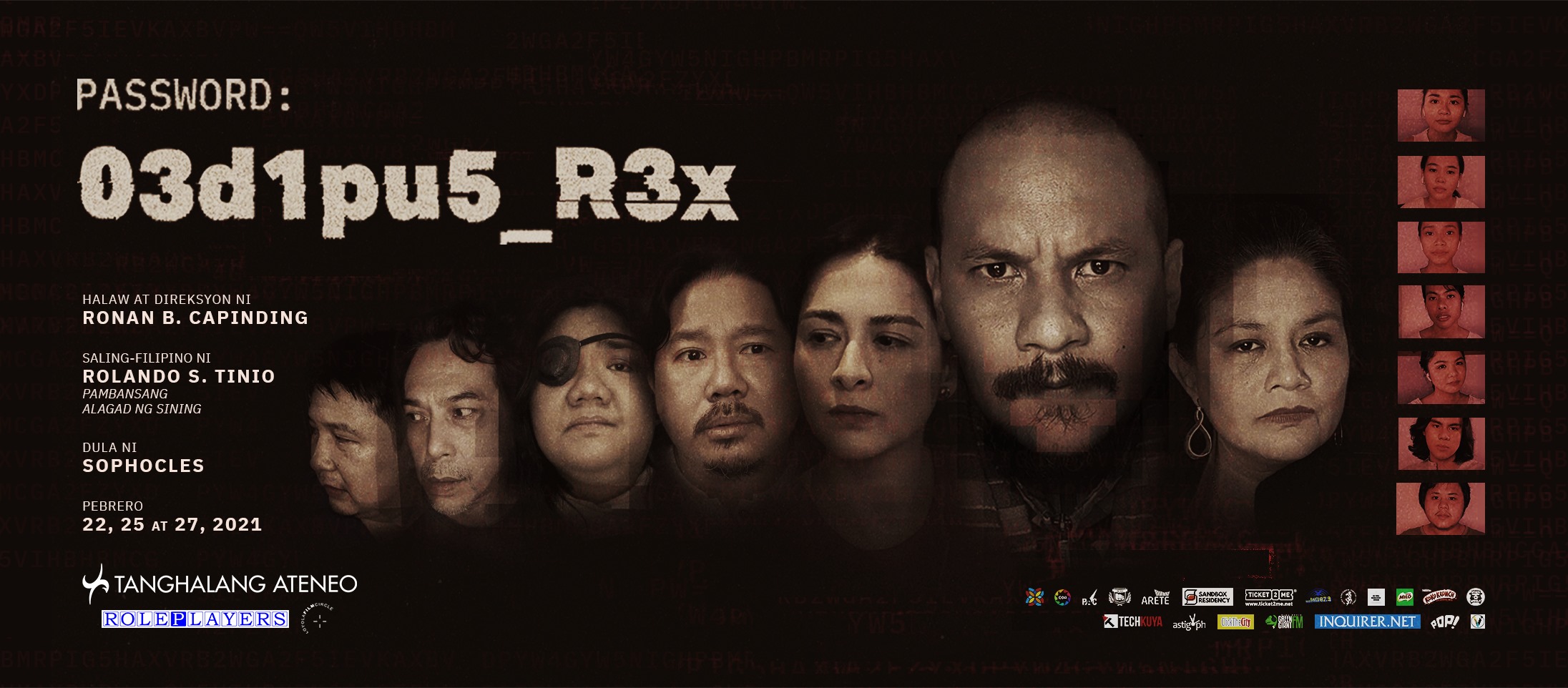How does one portray Greek tragedy without performing onstage? Tanghalang Ateneo presents a timely response in the form of Password: 03d1pu5_r3x. Adapted from Rolando Tinio’s Filipino translation of Oedipus Rex and directed by Ron Capinding, the play modernizes an ancient prophecy that’s uncomfortable to witness, but draws in audiences with relevance to the present.
Beginning with cries of discontentment from the government’s cabinet ministers, the narrative unfolds in a meeting with President Edipo (Yan Yuzon). Each cabinet member recounts the country’s turmoil amidst an ongoing plague, with Edipo as their only hope. Vice President Kreon (Marian Rivera) eventually relays a message from the Highest Council: The plague can only cease once President Edipo uncovers and punishes who murdered Laio, a former legislator. The search for a suspect leaves Edipo circling back to a prediction of his downfall.
Invested in hopelessness
With an unrelenting gaze, Yuzon powers through his role as a president, his charisma piercing through the screen. Edipo’s immense presence accurately depicts the rise of strongmen politics, further exemplified when paired with Kreon’s firm yet soft-spoken manner.
Meanwhile, Rivera’s debut as a theater actress transforms a spark of news into a blaze in Kreon, whose dignified disposition shows how capable a vice president can be. Her ability to maintain Kreon’s poised demeanor in the middle of chaos colorfully contrasts against Edipo’s assertion and the panic of the cabinet.
Throughout Edipo’s journey, composure slowly crumbles at the president’s merciless fate. With a stellar performance by Katski Flores, Maria Tiresias delivers a prophecy in dismay, establishing tension that builds up for the rest of the play. Alongside this, Yokasta’s (Miren Alvarez-Fabregas) exuberant confidence as Edipo’s wife dwindling into a spiral of regret further adds to the twistedness of her husband’s path.
As key roles in filling the gaps of Edipo’s prophecy, Lysanias (Gabe Mercado) and Egeo (Marlon Rivera) hesitantly spill truths under relentless pressure. Their performances intensify the audience’s helplessness in a lost cause, subjected to people’s unwavering faith in Edipo’s diminishing power.
Unusual times through art’s familiarity
In the unavoidable marriage between theater and film, sudden zoom-ins and spiralling boxes remind us of how much theater has had to adjust to circumstance. Monochromatic clothing, save for Kreon’s red attire, leaves noticeable room for potential in costume design to ease the process of color grading.
The differences of performing onstage from embodying a character in front of a camera are made clear in moments of intense projection, which theater actors are more accustomed to. However, Rivera’s film and television experience balances this out with subtler delivery. Although the contrast is understandable, exaggeration that would work wonders for a live performance becomes overbearing every now and then.
Nevertheless, credit is deserved for the editing process (Bianca Baltazar). Limits of today’s theater scene push the boundaries of inventiveness, creating character-driven scenes aided with graphics and visual effects (Miggy Arnonobal) that symbolize Edipo’s eventual end. A simple yet menacing original score (Zak Capinding) helps actualize the gravity of the story.
Combining theater and film elements creates one of Password: 03d1pu5_r3x’s biggest strengths: A theater piece packaged to be eerily familiar in the concept of video meetings and public media broadcasts.
Now that we’ve grown comfortable living in the digital space, Password: 03d1pu5_r3x is a necessary interruption. Witnessing such a harrowing tale unfurl evokes real despair among viewers, akin to the emotions surrounding Philippine politics and the COVID-19 pandemic. The production brilliantly parallels Greek mythos with the country’s current state, putting into perspective how disconcerting a pandemic can be—much like the mystery of prophecy.






